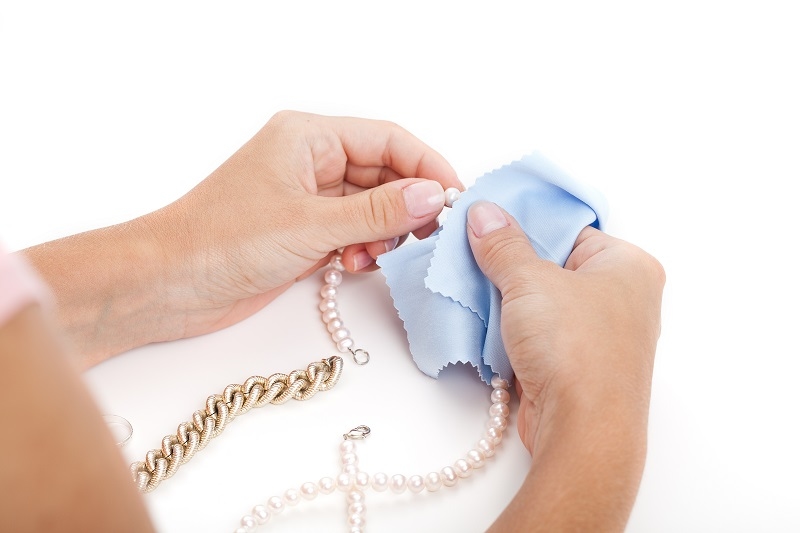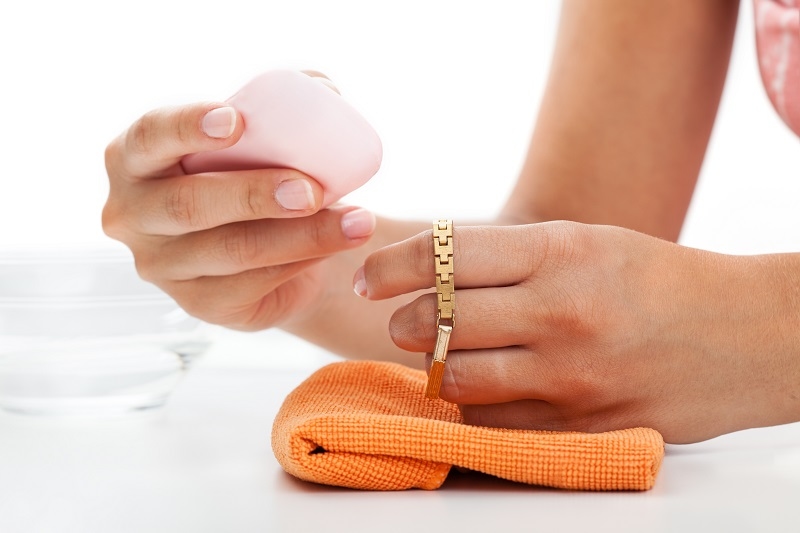Necklace Cleaning Guide to Restore the Shine of Metal

Jewelry is not something frivolous; it's a statement, a keepsake, and most often, a statement of our uniqueness. Among the most valued things in a jewel box are necklaces. Whether a stylish chain, a show-stopping pendant, or a cozy family heirloom, it's vital that they are clean and shining. However, over time, exposure to air, sweat, moisturizers, and regular wear and tear could make your necklaces dull and lose their sparkle. That’s where a necklace cleaning guide becomes indispensable.
In this guide, we’ll explore everything from how to clean delicate chains to the best way to clean pendants and how to ensure your necklaces remain flawless without damage.
Why Regular Necklace Cleaning Is Important
Metal-type and gemstone-type necklaces become tarnished, discolored, and soiled. Especially with the metals silver, gold, and platinum. They even get damaged by the continuous exposure to humidity, perfume, and oils from the body. Daily cleaning:
- Restores its own original sparkle and shine in the metal.
- Covers long-term tarnish and corrosion.
- Extends your necklace's life by many years.
- Preserves gemstones and pendants' sparkling hue.
Understanding how to clean necklaces helps you stay miles away from breaking fragile pieces by accident. It is therefore critical that you reference a reliable necklace cleaning guide.
Different Types of Necklaces
It is important that you familiarize yourself with the different types of necklaces you might own before our study of how to clean them:
- Dainty Chains: Delicate gold or silver chains that are generally short and prone to getting twisted and broken.
- Pendants: Necklaces with a center piece gemstone or charm that requires special care.
- Statement or Chunky Necklaces: Thicker pieces typically made of welded metals or plated in decorative patterns.
- Plated or Costume Jewelry: Low-cost metals coated with a substance that can be stripped if cleaned improperly.
It is most crucial to know the nature of the necklace when deciding on the optimal and safest way of cleaning. Instructions on how to clean dainty chains, say, are completely different from cleaning a large pendant.
Cleaning Necklaces Without Damage
Arguably, the most important thing to keep in mind about cleaning jewelry is not to damage it. Scratches, kinked links, or lost stones are possible outcomes if cleaning is incorrect. For cleaning necklaces without damage, do the following:
- Avoid Harsh Chemicals: Bleach, ammonia, and scrubbing cleaners destroy metal and gems.
- Use Soft Materials: Soft-bristled toothbrushes or microfiber cloths are nice to use to carefully brush off dirt.
- Soak Gently: Soak gently with warm soapy water to remove the dirt without injuring the metal.
- Dry Properly: Dry by air or by a soft cloth so that water will no longer promote tarnish.
Thus, your necklaces will also be usable for an extremely long period of time, with luster and shape preserved.
Safe Home Solutions for Chains
Professional cleaning is not always feasible for the majority of necklace wearers. Luckily, there are several in-home safe home solutions for chains that are easy and readily available:
- Mild Dish Soap and Warm Water: Combine a small amount of mild dish soap with warm water. Soak for 5-10 minutes, wash gently with a soft toothbrush, rinse, and dry.
- Baking Soda Paste: Combine baking soda and water to make a paste. Rub the silver chains gently to descale, wash out, and dry.
- Toothpaste (Non-Gel, Non-Abrasive): Very gentle on silver and gold and will pick up dirt from the surface. Use sparingly, brush, wash, and dry.
- Vinegar and Water Solution: Combine equal parts vinegar and water (1:1) to clean silver chains. Soak for a short while, wash, and dry.
These are readily available, very cheap, and harmless to use if used carefully, so you can clean and shine your jewelry at home.

How to Clean Delicate Chains
Fine chains are most vulnerable when being cleaned. Below is how you can safely clean fine chains step by step:
- Soak in Warm Soapy Water: Warm water and gentle dish soap. Soak 5-10 minutes.
- Gently Brush: Gentle brush. Brush dirt off gently, especially from snug links.
- Carefully Rinse: Carefully rinse in lukewarm water, keeping the chain away from coiling around in the sink drain.
- Dry Flat: Place the chain flat on a soft surface to dry. Avoid hanging, since the weight of water can stretch slinky-thin links out.
- Cleaning them this way, you can keep your delicate chains intact and yet have them looking fantastic.
How to Clean Pendants Properly
Pendants usually consist of gemstone, enamel, or quality craftsmanship, and should be handled carefully. The best way to clean pendants without any harm is described below:
- Take Pendant off Chain: Wherever possible, remove it so that the pendant and chain can be cleaned separately.
- Soft Cloth: Clean on the outside gently to remove dust and oils.
- Warm Water and Delicate Soap for Gemstones: Soak gemstone jewelry in warm water and delicate soap. Avoid soaking porous stones like pearls or opals.
- Light Brushing: Gently brush delicate details with a soft toothbrush in a bid to clean crevices.
- Clean and Dry: Wash under clean water and dry slowly with a soft cloth.
These techniques give your pendant a shine and the stones a natural appearance.
Professional Necklace Polish Services
Home techniques are wonderful, but there are gems that have to be polished by a professional. Professional polishing is best for:
- Heirlooms or antiques that would be ruined by home polishing.
- Necklaces with sensitive or fragile stones.
- Silver or gold fouling that requires professional-quality polishing techniques.
Pros use ultrasonic cleaners, steam cleaning, and gentle polishing compounds to restore luster without sacrificing integrity. For valuables such as precious jewelry, occasional visits to a jeweler are money well spent.
Additional Necklace Shine Tips for Care
Clean is only half the battle of jewelry care. To maximize necklace shine longevity:
- Store with Care: Store chains uncoiled in individual pouches or compartments.
- Prevent Tarnish: Keep jewelry away from moisture to prevent tarnish.
- Remove Before Use: Take off necklaces before swimming, showering, or exercising.
- Use Anti-Tarnish Strips: Silver chains work better with anti-tarnish strips in your jewelry box that protect them from oxidation.
- Periodic Maintenance: Clean jewelry every three weeks, depending on usage.
Adopting these habits, your necklaces will shine with less maintenance.
Common Mistakes to Avoid
Even with good intentions, some of the cleaning mistakes do turn out to be harmful
- With Abrasive Cloths or Cleaners: Tears up more sensitive metals and gems.
- Soaking for too Long: Ruins plated jewelry pieces or delicate stones.
- Pulling or Yanking Chains: Link loss or pendants loosen.
- Mixing Metals While Cleaning: Silver, gold, and plated work might respond differently, and they discolour.
Avoiding such errors, safe cleaning, and longevity are guaranteed.
Home Cleaning vs. Professional Services
The choice between professional polishing for necklaces and home remedies for cleaning chains boils down to a few factors:
- Jewelry Worth: Delicate or expensive jewelry should be cleaned professionally.
- Metal or Gemstone Type: Porous or fragile gemstones are destroyed by home remedies.
- Convenience and Time: Home remedies are convenient, cheaper, and best for upkeep.
- Desired Shine: Professionals can deliver a shiny shine that is difficult to achieve at home.
Most everyday necklaces are content with cleaning at home. Periodic professional cleaning, however, guarantees long-term care.
Step-By-Step Necklace Cleaning Guide Summary
Below is a quick summary of the necklace cleaning guide:
- Know the Necklace Type: Chain, pendant, statement, or plated jewelry.
- Select a Safe Clean Technique: Soapy water, baking soda paste, or professional cleaning.
- Clean Carefully: Brush gently, briefly soak if necessary, and rinse lightly.
- Dry and Store: Dry with a soft cloth wipe, store apart to avoid scratching or tangling.
- Regular Care: Repeat every few weeks for ongoing shine.
By applying this step-by-step care, you can make and keep any metal necklace intact without damaging it.
Conclusion
You don't need to lose your mind to take care of your necklaces. With a good cleaning guide for necklaces, some safe home treatments for chains, and information on how to clean valuable chains and how to clean pendants, your jewelry can shine and be beautiful for decades. Home techniques are ideal for routine maintenance, but do not be afraid to obtain professional necklace polishing for valuable or fragile pieces.
A saved necklace keeps you stylish, though, also in memory and meaning. Add in your own cleaning habits and smart storage, and you'll have every chain and pendant sparkling as lovely as the day you first wore them.
This content was created by AI

